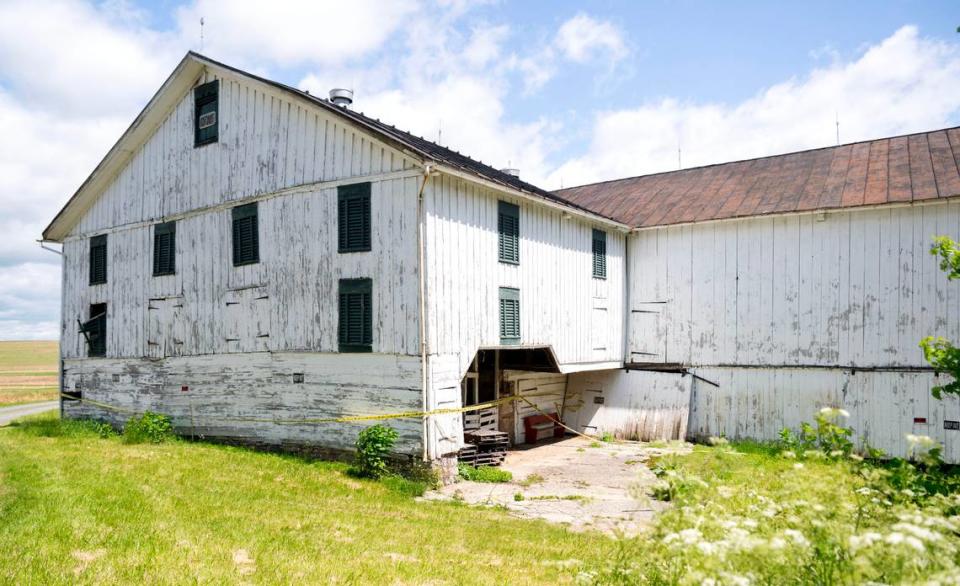Penn State has agreed to hold off on plans to demolish a historic barn in Centre County for a month, but what happens next is unclear as advocates for saving the barn fear the loss of a local landmark.
Siblings Richard Kepler and Vicky Kepler Didato’s family previously owned the farm, located along state Route 45 in Ferguson Township. Their great aunt, Millie Kepler, took over the farming operation in the late 1920s after her husband, Aaron Kepler, died.
She worked there from then until her death in 1990. Richard Kepler and Kepler Didato have many fond memories of playing at what came to be known as the Kepler Barn. To this day, Richard Kepler can remember the taste of his Aunt Millie’s concord grapes.
“She had what I thought were the best concord grapes I’ve ever tasted. I’m 69 now and I still have not tasted better concord grapes than what she had growing right there outside her farm,” Richard Kepler said during a phone interview.
He’s worried that if Penn State’s plans to demolish the structure go through, memories are all he’ll have left of the barn, with its history lost to future generations.
‘Significant historical structure’
Penn State has owned the barn since the 1990s. When Millie Kepler owned it, it was kept in perfect condition, Richard Kepler said.
“I knew at a young age, she was just very adamant about that farm and taking care of it. I’ve never seen a barn or a farm area this spotless almost, it was stunning. I remember thinking that being a young child. But that was the way Aunt Millie was,” Richard Kepler said during a phone interview.
As Lancaster Farming reported in March, Millie Kepler was a “remarkable” female farmer who was dedicated to her farm — even winning awards — despite many tragedies in her life. One son died a month after he was born, her husband died at a young age and not even two years after his death, their other son died at 13 years old.
Shortly after, she learned that the farm was $20,000 in debt, Richard Kepler said, and mortgaged the farm through a bank. A single mother of two teenage daughters with no income outside of the farm, Millie Kepler paid it off within five years, he said.
“That’s just unbelievable,” Richard Kepler said. “She did everything herself.”
The barn is one of the largest 19th-century bank barns in the area. Throughout the years, Millie Kepler had crops such as potatoes, strawberries and berries, and oats.
“The barn is, I’m telling you, it’s a museum. You don’t even need a tour guide, just as it stands there, is a museum,” Richard Kepler said. “The way she ran that potato production … it was quite the organization. My sister Vicky and I used to go out there and watch it like we were at the world expo or something.”
Due to several factors, Penn State plans to tear the barn down, and the family aren’t the only ones concerned about it.
Mary Sorensen, executive director of the Centre County Historical Society, said if the barn is demolished, they’ll lose history that can’t be replaced.
“The barn’s merits are in the 200+ year history of the farm, the prominent families that lived there, its visual dominance in a historic rural landscape, and its architecture. The demolition of such a significant historical structure would not only result in the loss of a beloved landmark in the rural Pennsylvania Furnace landscape but also deprive future generations of the opportunity to connect with this heritage. Once demolished, this piece of history cannot be replaced, and the cultural richness it represents will be lost,” Sorensen wrote on behalf of the Centre County Historical Society.
Historic barns offer insights into the agricultural heritage and the lives of the people who built and worked on them, the CCHS said. Preserving them is not only essential to maintaining the character and identity of the rural landscape in Centre County, Sorensen said, but it also aligns with efforts to promote sustainable development and conservation practices.
“Repurposing historic structures for modern use not only reduces waste but also contributes to the revitalization of rural communities and promotes a sense of pride and identity among residents,” the statement reads.

How did we get here?
Penn State purchased the farm in the 1990s; it is part of more than 2,000 acres of land that makes up the agricultural research facility, near where Ag Progress Days are held.
But in the years since, the barn has become “structurally unsound and unsafe for occupancy,” Penn State said in an emailed statement (the university denied an interview request for this article). It pointed to the barn’s age, additions and hazardous materials, as well as the university’s budget.
The university has delayed tearing down the barn for several years, the statement said, and has looked for alternative solutions to restore the barn including trying to find a potential buyer for the structure, exploring a philanthropic campaign to refurbish it, and engaging with organizations to preserve the barn.
None of the efforts produced a viable solution, the university said.
“The plans to remove the Kepler Barn are necessitated by the University’s current budget challenges, the overall condition of the barn, the projected costs to renovate or restore it, and the operational needs of our agricultural research practices,” the university’s statement reads. “Ultimately, as a public university responsible for good financial stewardship of both tuition and taxpayer monies, and with a need to mitigate unsafe conditions, we unfortunately cannot take on an expense of this nature. However, we are working with the Historic Barn and Farm Foundation of PA to explore alternatives.”
At the end of May, Penn State agreed to a one-month “freeze” in its plans at the request of the Historic Barn and Farm Foundation of Pennsylvania to pursue alternative solutions.
Priscilla deLeon, president of the HBFF-PA, in a phone interview said they are appreciative that Penn State gave them the month and are looking for ways to preserve or save the farm.
“(The HBFF-PA is) trying to preserve as many barns as we can, they’re a treasure. With Penn State being an agriculture college or university, it sets a standard to the state,” deLeon said. “Do you care about history? Do you want to try to preserve it, do you want to show the students that this is the way life was back then, and work it in the curriculums and try to tell the story about those barns?”


‘First time in my life I’ve ever felt a little frustrated with Penn State’
The Keplers are a Penn State family — more than 30 family members have graduated from the university.
“My heartstrings are torn on this,” Vicky Kepler Didato said. “This is a prime, prime opportunity for a win-win. Penn State started as a land grant agricultural college. Aaron Kepler, Aunt Millie’s husband, … went to Penn State, got his agricultural degree there. This farm, I think, is one of … the oldest barns in the state. It’s also, if not the largest, one of the largest (barns). And it was the largest potato farm in the entire state of Pennsylvania during the Depression. I mean, there’s so much history.”
Kepler Didato is hoping to see the barn saved and turned into a training center or something else that the university could utilize and share the rich history with the public.
“It’s not about my family history. Obviously, I’ve got a personal investment in it. But I’m amazed at how connected the farming community is not just in that area, but statewide,” Kepler Didato said.
There’s also a possibility that it is connected to the Underground Railroad, although it’s difficult to trace, Lancaster Farming reported.
Richard Kepler said this is “the first time in my life I’ve ever felt a little frustrated with Penn State.” He doesn’t understand why the barn would be taken down and why the university isn’t doing “everything possible” to keep it.
“The only thing I’ve heard or read is all about finances. And if that’s the case, that’s the weakest argument I think they have because these are the people, again, that have raised millions of dollars to purchase these farms,” he said. “…Nothing falls into disrepair, it’s just simply ignored or not taken care of. Which is, again, a great mind blower. What happened? Come on now. A single, widowed mother for 60, 70 years could keep this thing immaculate, running. And an agriculture department made up of how many people, with how many millions of dollars, wakes up one day and says, ‘Oh, it’s falling apart. We’re going to tear down.’”
What’s next?
Penn State said that if no viable alternative solutions are presented, they’ll proceed with the barn’s removal. If that happens, they plan to pursue a potential historical sign or commemorative recognition in the area of the barn to recognize its legacy and the contributions of the Kepler family.
The Centre County Historical Society said while they understand there may be challenges and costs associated with preserving the barn, they believe that is outweighed by the benefits of “safeguarding our shared heritage.”
“We encourage the exploration of alternative solutions, such as adaptive reuse or at least stabilizing the structure to preserve the historic landscape. If this is not possible, we hope that Penn State will, at minimum, reconsider working with the Historic Barn and Farm Foundation to have the Kepler Barn measured and photo documented for future research,” the society said.
Penn State said it has made investments to restore barns and other structures in the past, like the renovation of the barn across from the Department of Agriculture Livestock Evaluation Center and the Parsons Barn on the Ag Progress Days site.
“We appreciate that these farms and barns, and the families that lived there, are part of the history, memories, and stories of our region,” the university said in a statement.


Source Agencies


